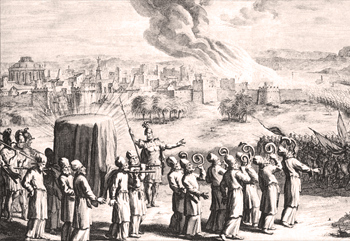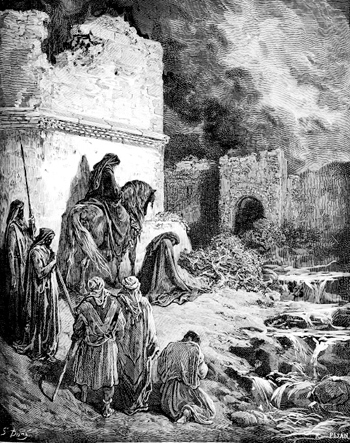Editor’s note: Faith & Leadership offers sermons that shed light on issues of Christian leadership. This sermon was preached Oct. 1, 2006, in Duke University Chapel in observance of Founders Day.
It takes you by surprise. You get a phone call. Or maybe someone calls round to your house unannounced. You can tell by the tone of voice that this is something different. “Have you got a few moments. Can I talk to you about something?” You say “Yes, of course. Why don’t we sit down?” Your heart misses a beat because you feel the intensity of the moment. And within a few seconds a new reality unfolds. Something deep down in your stomach starts to tell you: “This conversation is going to shape the rest of my life. This news affects me in a different way to the way it affects anyone else.”
That’s what it was like when Esther got a message from her cousin Mordecai. They were living in Susa, one of four capitals in the great Persian Empire. It was 475 years before Christ. A hundred years previously, the Jewish people had been overrun by the Chaldeans and had been taken into exile in Babylon. Fifty years later, Babylon was conquered by the Persians and the Jews were allowed to return home. But some Jews chose to stay where they were. They had discovered something very important. God did not just live in the land of Israel. God was here too. Mordecai and Esther were among those Jews who stayed.
But living as a Jew at the heart of the Persian Empire was a risky business, as the book of Esther makes clear. Straightaway we meet King Xerxes, known as Ahasuerus in this story, and we find the most powerful man in the world to be a reckless, extravagant, and easily manipulated character. This is especially dangerous because when he passes a law, that law cannot be changed, even if it turns out to be a disaster. The king is so absent-minded that even when Mordecai saves his life, he forgets all about it. Not only do the Jews live under an unreliable monarch and an unworkable legislative system, they also have sworn enemies. One is called Haman. Haman and Mordecai despise each other, and when Haman rises to the post of prime minister, Mordecai riles him so much that he manipulates Ahasuerus into issuing a decree that will wipe out all Jews in the Empire. You need to remember that Israel was still part of the Persian Empire at this point. So the king’s decree threatens to eliminate the Jews from history altogether.
There is only one faint hope for the Jews -- one tiny thread holding them up from the abyss. Five years before the passing of this decree, Mordecai’s cousin and adopted daughter Esther, without revealing her ethnic identity, had joined the king’s harem, undergoing a year-long grooming to prepare her for a one-night stand with the king. Ahasuerus liked her so much he made her his queen. Being queen did not give Esther the automatic intimacy with the king one might imagine. The king still kept his harem, and no one got to address the king unless he took their fancy and he waved his golden scepter at them. (The symbolic significance of the golden scepter is something I’m going to leave to your imagination. But let’s just say that the Bible has a broad sense of humor the so-called Moral Majority seldom gives it credit for.) If you approached the king without him waving his golden scepter at you, you would be put to death, even if you were the queen.
So this is the context for Mordecai’s conversation with Esther. Esther, despite being queen, is so isolated that she doesn’t even know that the Jews are due to be exterminated in a few months’ time. Mordecai tells her about the catastrophic decree. He somehow omits to tell her that the decree came about partly because of his mindless stubbornness in angering Haman. But he does say -- “Look, Esther, you’re the only one who can do something about this.” You can feel Esther’s stomach muscles tightening and her breath getting short. She tries to escape: “But don’t you realize that if I approach the king without him waving the scepter at me I’m dead meat?” Mordecai says coolly, “What makes you think you’re going to survive this massacre? Being queen ain’t gonna help you. If you keep silence and do nothing at this moment, God will eventually turn this whole thing around and his chosen people won’t be utterly annihilated. But it’ll be too late for you and me. Maybe this was exactly why you became queen. You thought it was saving yourself, but God thought it was for saving his people. Maybe God put you here for exactly this moment, for just such a time as this.”
And what does Esther do at this decisive moment? She stops denying, stops ignoring, stops making excuses, stops running away. She realizes this needs more than her own strength, so she falls back on the devotional habits of her people and calls on the Jews to fast with her. She resolves that she will face up to her responsibility and go in to the king, great wobbly scepter and all. She recognizes that what she must do must include disclosing her true identity as a Jew. She takes stock of the realities of her situation and says simply, “If I perish, I perish.” She goes to the heart of the empire to save the Jewish people. She becomes Christ.
Don’t miss the fact that we have a mini-gospel here. The great king Ahasuerus, ruler over practically the whole world, is a clumsy parody of God. Mordecai is a kind of Adam, whose pride puts his whole people at the point of death. Haman is a kind of Satan. And Esther is a kind of Jesus, at the right hand of God, laying down her life for the salvation of the Jews. The whole story of Esther by the way is structured around 10 meals, just as the Bible is a story stretched between the first meal of Adam and Eve, the Last Supper of Jesus and the disciples, and the final heavenly banquet of the kingdom of God.
Esther does save her people. She does so because she is stirred to an act of extraordinary fortitude. She does so because she strings Ahasuerus along till he is putty in her seductive hand. She does so because of a benevolent turn of events triggered by the king’s insomnia. And she does so because Haman’s outsized ego and his hostility to Mordecai obscure his political judgment. In other words Esther requires a mixture of courage, charm, contrivance, and luck. The king issues a new decree that enables the Jews to live another day.
The story teaches us a number of general lessons. It teaches us that life under arbitrary authority is dangerous for everybody, especially women and minority ethnic groups. It teaches us that power is not simply an all or nothing thing -- Esther is queen and yet still vulnerable, she is a Jew and yet she can marry the most powerful man in the world, she can be unaware that she is shortly to be executed yet she can wrap the king around her little finger by using her exquisite sense of timing, her insight into human nature, her beauty and her sexual expertise.
But the heart of the story lies in these echoing words, words which I hope make your stomach tighten and your breath falter just as much as if Mordecai were saying them to you today. “Perhaps you have come to this place, to this moment, to these people, to this challenge, for just such a time as this.”
Eighty years ago some people heard these words, or words something like them. People like James B. Duke and William Preston Few recognized that they had been placed on this earth for just such a time as this. They caught a glimpse of what Duke University could be. James B. Duke could have sat on his tobacco money, William Preston Few could have settled for being president of a tiny liberal arts college. Esther could have enjoyed the luxury of being queen of most of the known world. But someone, some Mordecai, grabbed their ear at a crucial moment, and said to them: “Maybe you have been given this money, this talent, this vision for just such a time as this.” They listened. And that’s why we’re all here.
I want you to think about Esther. She had some things. She lacked other things. She had beauty. She had a certain kind of training. She had a very ambitious cousin. She had a very powerful husband. But she didn’t have any power over her own life. She didn’t have any security in the face of those who planned to kill her and her people. She didn’t have any real personal intimacy with her husband.
Think about Esther, and then think about yourself. You have some things. You lack other things. Maybe you have the gift of great intelligence. Maybe you don’t have great brains, and are free of the burden of feeling you have to be clever all the time. Maybe you have good looks. Maybe you don’t have good looks, and are free of the projections and expectations good looks can bring. Maybe you have had a calm and stable family life, and understand what trust and promise-keeping and security mean. Maybe you have known none of these things, and yet have experience of hardship and anxiety and fear that may come to be of value to others who sense a little of the panic that Esther felt. Maybe you have a prominent public role, as a professor or an administrator or some other job that puts you behind a big desk. Or maybe you have the freedom of being out of the limelight, your actions not being perpetually judged and your words not being endlessly evaluated.
Think about yourself, what you uniquely have and what you uniquely lack. And then think about the context you are in. Think about the ways you feel powerless. Think about the number of times you have said “What Duke needs”, or “What Durham needs”, or “What the American church needs”, or “What my family needs”, or “What the world needs”. Think about the number of times you have thought there was nothing or no one that could do anything about it.
And then feel, hear this exasperating man Mordecai tap on your shoulder, and say “Perhaps you have been given these skills and experiences, these privileges and deprivations, so that just at this very moment you could do what no one else could do, you could be what no one else could be. God made you just as you are because he wanted someone just like you. Maybe all this happened and you came to be here for just such a time as this.”
Think again about Esther. She didn’t have it all easy. Neither, no doubt, do you. She had some real gifts. So do you. She embarked on a long period of training and preparation, the final purpose of which for most of the time she didn’t really understand. Maybe this is how you feel too. She found herself at a crucial moment -- not a moment for sudden action, but a moment when she realized the rest of her life must be given for one cause that went way and above her own safety, her own privilege, her own status. You could call it a moment of conversion. And what she was converted to was a further time of preparation, of fasting, or planning, of biding her time, of waiting till it was worth taking an enormous risk and then of executing a careful plan. And perhaps most curious of all, the person who brought her face to face with her destiny was no saint but Mordecai, her stubborn, proud, scheming cousin who’d done a whole lot to put his people in this mess in the first place.
Maybe you’re an undergraduate, thinking “I’m too young to be worrying about all this stuff.” Maybe you’re a graduate student, thinking “Let me just get my dissertation done.” Maybe you’re a member of staff, thinking “Let me just get my kids through college and my mom out of hospital.” Maybe you’re a junior faculty member, thinking “Let me just get tenure.” Maybe you’re a Triangle resident, thinking “This isn’t about me, this is about all those university types.” Maybe you feel you’re getting on in years and you’re thinking “I made all those big decisions a long time ago.”
Watch out: here comes Mordecai -- not an easy character, not a role model, but nonetheless speaking the truth. He says, “Look back at all those parts of your story that make you unique, especially those events that felt like setbacks at the time but are now vital to who you are. Look at the position you’re in now, not obsessing about what it’s not, but seeing the unique opportunity you have. And look at these massive challenges facing us. Global challenges about intercultural understanding, poverty, disease and climate change. Ecclesial challenges about standing for doctrine and justice, unity and truth. University challenges about striving to be the best without forgetting to be good, about striving to find new things without forgetting the true things. And local challenges about inhabiting the story of the South without making it a prison, about Durham becoming a town of which all its citizens can be truly proud. Perhaps God has put you right here, right now, for just such a time as this.”
Esther listened. Without Esther there would have been no Jesus, because there would have been no Jews. James B. Duke and William Preston Few listened, albeit in a very different sense to Esther. Without them and people like them, there would have been no Duke, and none of us would be where we are today.
Will you listen? Will you do what Esther did, realize the reality of your situation, seek all the help you need, plan carefully, fast, and put yourself in the hands of God? Has God put you right here, right now, for just such a time as this?













